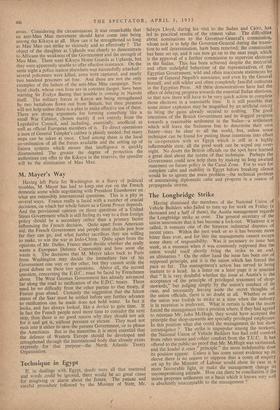The Longbridge Strike
Having dismissed the' members of the National Union of Vehicle Builders who failed to turn up for work on Friday (a thousand and a half of them), the Austin management regards: the Longbridge strike as over. The general secretary of the union-announces that it has become a lock-out. Whatever it is called, it remains one of the bitterest industrial disputes of recent years. Within the past week or so it has become more bitter than ever, and for this the management cannot escape some share of responsibility. Was it necessary to issue last week, at a moment when it was commonly supposed that the union would itself shortly bring the strike to an end. an ultimatum ? On the other hand the issue has been one of supposed principle, and it is the union which has forced the pace so far. The management's action has served to bring matters to a head. In a letter on a later, page it is asserted that " It is very doubtful whether the issue at Austin's is the acceptance of the principle of privileged treatment of shop- stewards," but judging simply by the union's conduct of its case, and necessarily leaving aside the secret thoughts of the union officials, there is no doubt at all. Whether or not the union was foolish to strike at a time when the industry is in recession is irrelevant. What is certain is that the union forced the management into a position where, if they had agreed to reinstate Mr. John McHugh, they would have accepted the; principle that shop-stewards are specially privileged employees. In this position what else could the management do but shoW intransigence ? The strike is unpopular among the workers: the National Union of Vehicle Builders has had cold comfort from other unions and colder comfort from the T.U.C. It has offered to the public no proof that Mr. McHugh was victimised, and the louder it cries " principle " the more indefensible does its position appear. Unless it has some secret evidence up its sleeve there is no reason to suppose that a court of enquiry set up by the Minister of Labour would ,show its case in a more favourable light, or make the management change its uncompromising attitude. How can there be conciliation if the union proposes settlement on a basis which it knows very well is absolutely unacceptable to the management ?


































 Previous page
Previous page